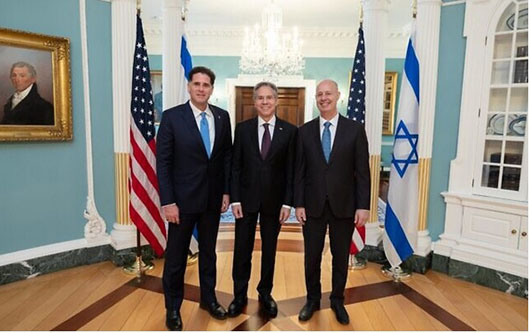FPI / March 8, 2023
In meetings with top U.S. defense officials over the past two weeks, Israel has attempted to create a united front against the rising threat from Iran and its stable of terrorist proxies.

On March 7, Israeli National Security Adviser Tzachi Hanegbi and Strategic Adviser Ron Dermer were in Washington to discuss Iran with the Biden administration. That meeting followed a visit to Israel over the first weekend in March by U.S. Chairman of the Joint Chiefs of Staff Gen. Mark Milley and in advance of a visit to Israel by U.S. Defense Secretary Lloyd Austin.
Central to the discussions is the “full constellation of Iran-associated threats…” a senior defense official was quoted as saying on the Pentagon’s official website ahead of the U.S. defense chief’s visit.
“Those threats include Iran’s arming, training and funding of violent proxy groups, aggression at sea, cyber threats, its ballistic missile program and drone attacks,” the official said.
Countering that threat and building a cohesive front is not an easy undertaking given a series of botched foreign policy moves made by the Biden administration, an analyst said.
After interviewing Israeli Prime Minister Benjamin Netanyahu late last month at the Tikvah Israel Security Conclave, Walter Russel Mead wrote for the Wall Street Journal:
“I came away thinking that the U.S. is much closer to getting involved in another Middle East war than most in Washington understand, and that minimizing this danger requires rapid and sweeping policy change from an administration still struggling to comprehend the most serious international crisis since the late 1930s.”
When it came into office in January 2020, the Biden administration’s foreign policy strategy was to “park Russia by accommodating Vladimir Putin and stabilize the Middle East by reviving the nuclear deal with Iran even as it pursued aggressive trade and security policies to limit China’s rise,” Mead noted.
“Two years later, the Biden administration is struggling to manage the failure of its original design. Instead of facing an isolated China in an otherwise calm world, the administration faces simultaneous confrontations in Europe and the Far East. Russia isn’t parked, Iran isn’t pacified, and the three revisionists are coordinating their strategy and messaging to an unprecedented degree.”
Full Text . . . . Current Edition . . . . Subscription Information
Free Press International
